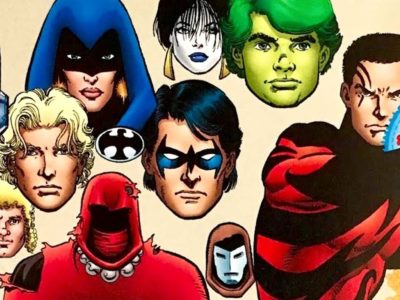
[ad_1]
The X-Men’s expansion into space may provide new opportunities, but it also presents new challenges – something Risque sees better than most.
After securing Krakoa as a haven for all mutants, the X-Men have set their sights spaceward, hoping to establish mutant colonies on other planets. But this goal comes with complications.
Given that the Marvel universe is home to alien civilizations such as the Kree and the Shi’ar, it stands to reason that the universe may be home to more alien races than those known by Earth’s humans and mutants. Every planet, every moon, could boast a not yet discovered civilization. Therefore, the X-Men must tread carefully when venturing into intergalactic affairs – a fact that the mutant Risque emphasizes when she is sent on a scouting mission for S.W.O.R.D. to find new worlds for the X-Men to terraform.
In the short comic “Operation: New World” (by Desirée Proctor, Erica Harrell, Paco Medina, Federico Blee, and VC’s Ariana Maher), from the anthology, Marvel’s Voices: Comunidades, Risque investigates a Kruellian moon to determine whether it could support a mutant colony. While taking a sample of water from the ocean, the residents of this planet, sea-dwellers with an advanced underwater civilization, abduct her. Risque escapes unharmed and informs S.W.O.R.D. leader Abigail Brand that the moon’s pre-existing alien society makes it unsuitable for Krakoan terraforming. Brand agrees to leave the alien civilization in peace and find another planet to terraform.
Though the prospect of establishing a mutant presence in space excites most of the X-Men, Risque is a bit more skeptical of the idea. She is particularly adamant about ensuring that they don’t try to terraform any planets or moons with existing life on them already. As a person of Seminole heritage, she doesn’t want the X-Men to engage in the settler-colonialism that wiped out many of her ancestors. She is all too familiar with the horrors that conquering invaders wrought on Indigenous people. The historical parallels of the X-Men’s current intergalactic exploration do not escape her. They evoke the brutal efforts of the conquistadors in the past, a realization that profoundly troubles her.
Risque’s ethnic background gives her a nuanced perspective on the aliens. Although the aliens attack and subdue her before allowing her to escape, Risque refuses to view them as hostile. Instead, she tells Brand, “They’re like any advanced life…complicated.”
Risque understands that the aliens only attacked her because she was trespassing on their planet. They were afraid that she might be a threat. Though a less empathetic mutant might have suggested retaliation against the aliens, Risque sees that the best course of action is to simply leave these aliens alone. It is easy for Risque to sympathize with their perspective since she has generational knowledge of the horrible things that can happen when one civilization tries to conquer another.
Brand’s decision to leave this moon in peace and search for an uninhabited planet to terraform shows that the X-Men are not the conquering invaders that Risque worried they might become. Though the X-Men are eager to establish mutant colonies in space, they refuse to do it at the expense of existing alien civilizations. Mutants were nearly at the brink of extinction at one point, and the X-Men wouldn’t wish that fate on anyone else.
This story shows how Risque’s perspective as a mutant with Indigenous heritage affects how she views the X-Men’s politics. Moreover, it illustrates how this perspective is valuable when it comes to possible future interactions between the X-Men and other civilizations. Her insight allows the X-Men to avoid a war with an alien culture and urges them to leave the aliens in peace instead of becoming the sort of intolerant and genocidal force the X-Men were trying to avoid in the first place.
About The Author
[ad_2]






